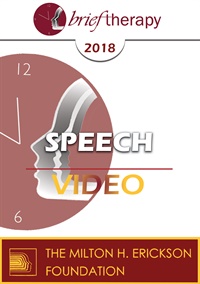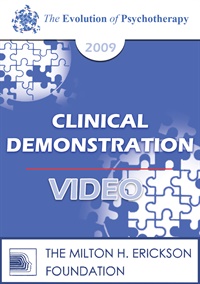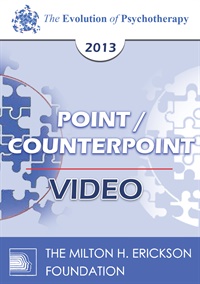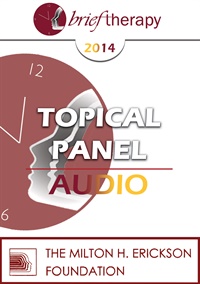
- Average Rating:
- Not yet rated
- Topic Areas:
- Topical Panels | Brief Therapy | Goals of the Therapist
- Categories:
- Brief Therapy Conference | Brief Therapy Conference 2014
- Faculty:
- Jeffrey Zeig, PhD | Pat Love, EdD | Stephen Gilligan, PhD
- Duration:
- 1:01:29
- Format:
- Audio Only
- Original Program Date:
- Dec 13, 2014
- Short Description:
- BT14 Topical Panel 05 - The Goal of Therapy - Pat Love EdD, Stephen Gilligan, PhD, and Jeffrey Zeig. PhD Educational Objectives: Compare and contrast clinical philosophical perspectives of experts.
- Price:
- $15.00 - Base Price
Credit available - Click Here for more information
- Average Rating:
- Not yet rated
- Topic Areas:
- Speeches | Children and Adolescent Therapy | Art and Creativity | Brief Therapy | Family Therapy | Anxiety | Depression | Goals of the Therapist
- Categories:
- Brief Therapy Conference | Brief Therapy Conference 2018 | Online Continuing Education
- Faculty:
- Lynn Lyons, LICSW
- Course Levels:
- Master Degree or Higher in Health-Related Field
- Duration:
- 1:02:45
- Format:
- Audio and Video
- Original Program Date:
- Dec 09, 2018
- Short Description:
- We don't often think of creativity and problem solving as equal partners in therapy with children. But when struggling families arrive at your office, it is the immediate blending of these two components that allows you and the family to move quickly from overwhelmed to engaged, confused to targeted. Based on 29 years of successes and failures, this speech will offer ideas to immediately connect with families, help them untangle the tired messiness they often arrive with, and create active interventions that build momentum, create new patterns, and offer hope.
- Price:
-
Sale is $29.00
price reduced from Base Price - $59.00

- Average Rating:
- Not yet rated
- Topic Areas:
- Couples Therapy | Workshops | Communication | Relationships | Goals of the Therapist
- Categories:
- Couples Conference | Couples Conference 2015
- Faculty:
- Harville Hendrix, PhD
- Duration:
- 1:38:54
- Format:
- Audio Only
- Original Program Date:
- Apr 24, 2015
- Short Description:
- Couples therapy tends to operate without a clear map of successful outcome, except the reported satisfaction/dissatisfaction of the couple. In this workshop, we will propose an optimal outcome of couple’s therapy, the process of reaching it and demonstrate the procedures that achieve it.
- Price:
- $15.00 - Base Price
Credit available - Click Here for more information
- Average Rating:
- Not yet rated
- Topic Areas:
- Couples Therapy | Keynotes | Continuing Education | Therapist Development | Goals of the Therapist
- Categories:
- Couples Conference | Couples Conference 2018 | Online Continuing Education
- Faculty:
- Ellyn Bader, PhD | Sue Diamond, MA, RCC
- Course Levels:
- Master Degree or Higher in Health-Related Field
- Duration:
- 1:00:59
- Format:
- Audio and Video
- Original Program Date:
- May 04, 2018
- Short Description:
- Sue Diamond Potts will interview Dr. Ellyn Bader about her 33 years specializing in couples therapy. They will discuss what it was like when she started and how the field has changed. They will especially focus on what Ellyn has learned from consulting to couples therapists from 33 countries. Ellyn will describe common mistakes therapists make and what it takes to help couples and couples therapists evolve.
- Price:
- $0.00 - $29.00

Credit available - Click Here for more information
- Average Rating:
- Not yet rated
- Topic Areas:
- Couples Therapy | Love | Continuing Education | Goals of the Therapist | Keynotes | Relationships
- Categories:
- Couples Conference | Couples Conference 2021 | Online Continuing Education
- Faculty:
- Stan Tatkin, PsyD, MFT
- Course Levels:
- Master Degree or Higher in Health-Related Field
- Duration:
- 1 Hour 2 Minutes
- Format:
- Audio and Video
- Original Program Date:
- Jun 05, 2021
- Short Description:
- As with any approach, couple therapy must have a clear vision toward which the couple can navigate. We may call this the therapeutic goal or therapeutic narrative. The clarity by which the therapist holds this vision and expects the couple to meet this goal largely determines therapeutic success. One such goal is the partner co-creation of a relationship ethos or ethical system based on shared purpose, shared vision, and shared principles of governance. A principle-based relationship, while not based on feelings, may prove vital to the prevention of common relational threat while essential to the fostering of mutually earned love, respect, and admiration.
- Price:
- $29.00 - Base Price
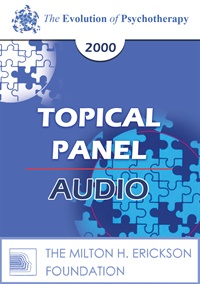
- Average Rating:
- Not yet rated
- Topic Areas:
- Topical Panels | Goals of the Therapist | Therapist Development
- Categories:
- Evolution of Psychotherapy | Evolution of Psychotherapy 2000
- Faculty:
- Bert Hellinger, MA, Dipl. Psych | James Hillman, PhD | Arnold Lazarus, Ph.D. | Miriam Polster
- Duration:
- 57 Minutes
- Format:
- Audio Only
- Original Program Date:
- May 27, 2000
- Short Description:
- Topical Panel 10 from the Evolution of Psychotherapy 2000 - The Goal of Therapy Featuring Bert Hellinger, MA, Dipl. Psych., James Hillman, PhD, Arnold Lazarus, PhD, and Miriam Polster, PhD. Moderated by Brent Geary, PhD.
- Price:
- $15.00 - Base Price

- Average Rating:
- Not yet rated
- Topic Areas:
- Topical Panels | Goals of the Therapist | Psychotherapy | Therapist Development
- Categories:
- Evolution of Psychotherapy | Evolution of Psychotherapy 2005
- Faculty:
- William Glasser, MD | Harriet Lerner, PhD | Francine Shapiro, PhD | Thomas Szasz, MD
- Duration:
- 56 Minutes
- Format:
- Audio Only
- Original Program Date:
- Dec 09, 2005
- Short Description:
- Topical Panel 03 from the Evolution of Psychotherapy 2005 - The Goal of Therapy Featuring William Glasser, MD; Harriet Lerner, PhD; Francine Shapiro, PhD; and Thomas Szasz, MD Moderated by Ellyn Bader, PhD
- Price:
- $15.00 - Base Price
- Average Rating:
- Not yet rated
- Topic Areas:
- Clinical Demonstrations | Psychotherapy | Relationships | Therapeutic Relationship | Motivation | Goals of the Therapist
- Categories:
- Evolution of Psychotherapy | Evolution of Psychotherapy 2009
- Faculty:
- Erving Polster, PhD
- Course Levels:
- Master Degree or Higher in Health-Related Field
- Duration:
- 59:32
- Format:
- Audio and Video
- Original Program Date:
- Dec 11, 2009
- Short Description:
- Educational Objectives: To describe how “immediate nextness”, followed continuingly, will lead to the achievement of therapeutic goals. To describe how absorbed relationship is a leavening process for the increased motivation of clients.
- Price:
-
Sale is $29.00
price reduced from Base Price - $59.00
- Average Rating:
- Not yet rated
- Topic Areas:
- Psychotherapy | Point/Counterpoint Sessions | Life Focus Community | Goals of the Therapist
- Categories:
- Evolution of Psychotherapy | Evolution of Psychotherapy 2013
- Faculty:
- Erving Polster, PhD | Jean Houston, PhD | Camillo Loriedo, MD, PhD
- Course Levels:
- Master Degree or Higher in Health-Related Field
- Duration:
- 1:28:45
- Format:
- Audio and Video
- Original Program Date:
- Dec 11, 2013
- Short Description:
- Huge numbers of people want to KNOW their lives as much as they want to CHANGE. This need to KNOW, long overshadowed in therapy by pathology, is evident every day in: ordinary conversation, the arts, the mindfulness movement and religion. History now calls for therapy’s attention to basic themes of living through the design of Life Focus Communities.
- Price:
-
Sale is $29.00
price reduced from Base Price - $59.00
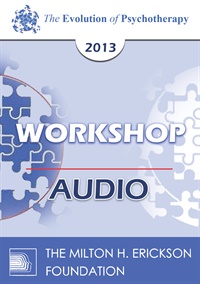
EP13 Workshop 25 – The Three Positive Connections Needed for Creative Change – Stephen Gilligan, PhD
- Average Rating:
- Not yet rated
- Topic Areas:
- Workshops | Goals of the Therapist | Psychotherapy | Resources | Somatic Experiences
- Categories:
- Evolution of Psychotherapy | Evolution of Psychotherapy 2013
- Faculty:
- Stephen Gilligan, PhD
- Duration:
- 2 Hours 39 Minutes
- Format:
- Audio Only
- Original Program Date:
- Dec 12, 2013
- Short Description:
- Psychotherapy is an exploration of how individuals can forge positive, therapeutic responses to life challenges. This workshop focuses on the three core connections that allow clients to do this: (1) Positive intention and goals (“towards a positive future”); (2) Somatic Centering (“embodied presence”); and (3) Field Resources (“positive connections beyond the problem”). We will see how in a repetitive problem, all three of these connections are typically absent. More importantly, we will see how clients may be helped to developed and sustain these positive connections while engaging with challenging material—e.g., a past trauma, a present difficulty, or a future possibility. Participants will be offered multiple techniques and examples, as well as several demonstrations to illustrate this positive orientation to psychotherapy.
- Price:
- $15.00 - Base Price
Please wait ...


